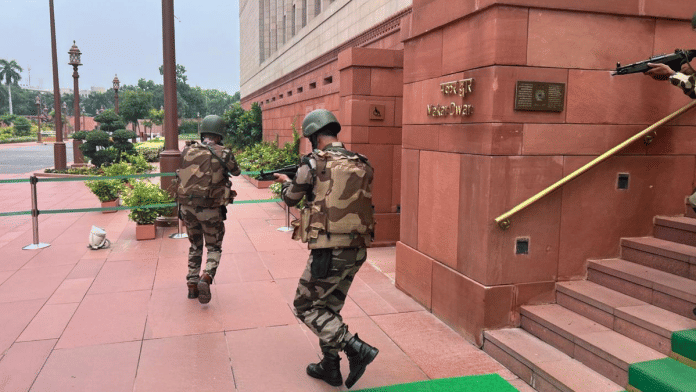New Delhi: The Central Industrial Security Force (CISF) has extended the tenure of personnel deployed at the Parliament House Complex (PHC) to four years, a revision aimed at strengthening security protocols and building familiarity with parliamentarians.
The move marks a departure from the standard three-year posting period that applies to most of the force’s workforce. Officials said the extended tenure can be prolonged by up to one year depending on operational requirements and individual suitability.
The revised posting policy addresses operational concerns that emerged after CISF assumed complete control of the Parliament Complex in May 2024.
“The extended tenure will further strengthen familiarity of personnel with Members of Parliament and movement patterns within PHC, which is critical for ensuring accurate identification, secure access protocols, layered threat detection and response,” a CISF spokesperson said Thursday.
The change aims to balance two objectives: ensuring operational continuity through experienced personnel while periodically introducing fresh faces to maintain vigilance and prevent complacency.
The Ministry of Home Affairs assigned CISF the responsibility for Parliament security following the December 2023 intrusion, when two people breached security and entered Lok Sabha chamber before being overpowered by MPs and marshals. The incident at the new Parliament building was reported on the anniversary of the 2001 Parliament terror attack.
Before CISF took charge, the security apparatus for Parliament House was divided between Delhi Police and Parliament Duty Group (PDG) of the Central Reserve Police Force (CRPF).
By 20 May 2024, CISF had assumed complete responsibility for all core security layers and deployed 3,300 personnel to manage access control, perimeter and internal security, counter-terror and counter-sabotage response, bomb threat management, and fire and disaster preparedness.
The force also assigned 200 additional personnel, including fire and disaster management specialists, for introducing airport-style security protocols featuring advanced frisking, X-ray baggage checks and multi-level access verification.
“The force has been consistently enhancing its capabilities to counter emerging threats, with specialised training modules focused on drone threats, cybersecurity, chemical, biological, radiological and nuclear response (CBRN), as well as battle-inoculation courses conducted with the National Security Guard (NSG) and elite units of the Indian Army,” the spokesperson added.
Updated guidelines for deploying gazetted officers and non-gazetted officers at the Parliament Complex now mandate a rigorous four-level screening process.
Personnel must undergo psychological assessment, clear the battle physical efficiency test (BPET), obtain security clearance reviewing their service records, and complete training specific to the parliamentary complex before being assessed on their readiness. “Only those qualifying all stages will be deployed for Parliament duties,” the spokesperson said.
CISF has also strengthened induction requirements, mandating that only personnel with clean service records and SHAPE-I medical category status—indicating full fitness for all duties—be considered for the posting. Those with disciplinary concerns or ongoing vigilance issues are automatically disqualified from selection.
(Edited by Prerna Madan)






